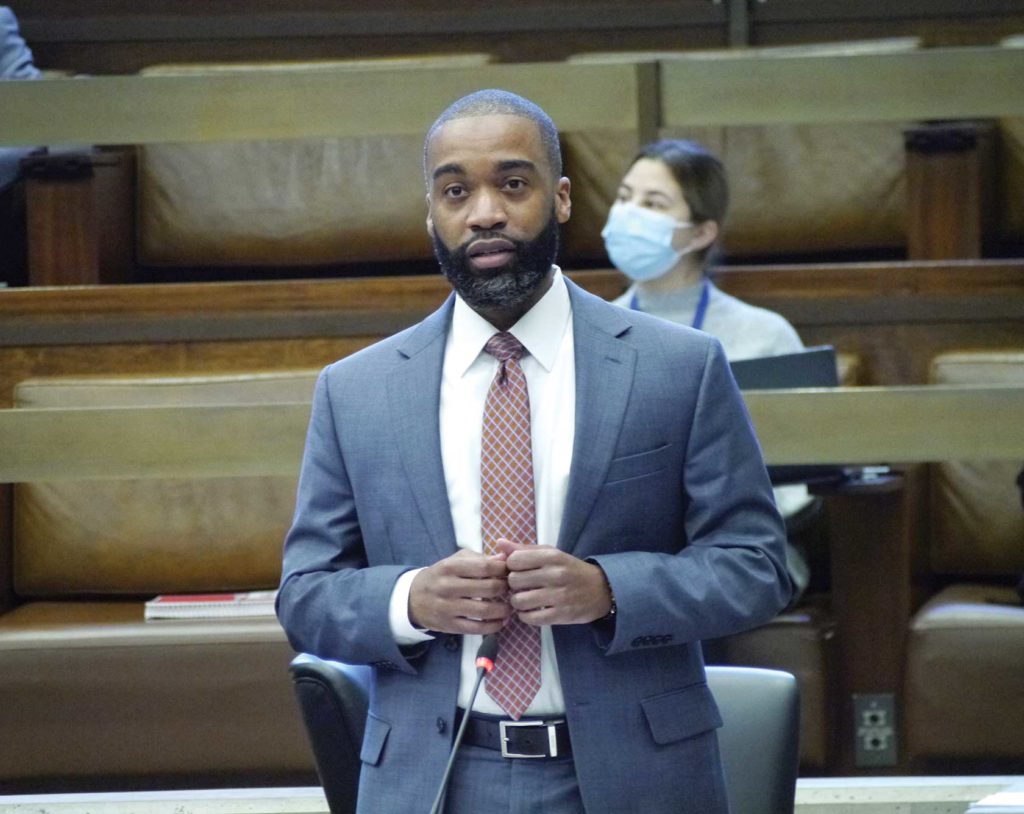
District 4 City Councilor Brian Worrell wants to use city contracting to boost businesses owned by people of color and push city housing policy to create more home ownership opportunities in Boston.
“The tools we have as a city have not been used to their full potential to ensure we are making headway and economic mobility for Black and brown communities and righting the wrongs of the government policies of the past,” he said during his maiden speech on the floor of the council last Wednesday.
Also giving her first speech as a councilor Wednesday, at-large Councilor Ruthzee Louijeune advocated eliminating immigration restrictions that have left Haitian refugees stuck at the U.S.-Mexico border and called for using city-issued bonds to fund the production of affordable housing and tackle the needs of the city’s low-income residents.

At-large Councilor Ruthzee Louijeune delivers her maiden address in the Iannell Chamber. BANNER PHOTO
“The more buildings we fund via bonds,” she said, “the more we will have in our budget to look at innovative ideas already underway in other cities to meet residents’ basic needs, such as social housing, such as guaranteed income — all of these are creative things we can be doing if we are leaning more into how we are using our bonds.”
The councilors’ speeches point to a decidedly activist bent among many of the new members of the body. While Boston City Councilors are often seen as minor players in the city’s “strong mayor” form of government, the body now has a majority of people of color and a majority of women, twin dynamics that have shifted the political discourse to the left.
With the election last year of socialist activist Kendra Lara to the Jamaica Plain/West Roxbury District 6 and Tania Fernandes Anderson, a Cape Verdean Muslim immigrant, to the Roxbury-based District 7, the body appears poised to push Mayor Michelle Wu on progressive issues.
Lara, who heads the council’s Housing Committee, campaigned on issues including support for a return to rent control and increasing the percentage of affordable housing produced in Boston. Fernandes Anderson, working with at-large Councilor Julia Mejia and Worrell, is backing a commission to study reparations for descendants of slavery in Boston.
“Across the board, the majority of the city councilors elected had platforms that spoke to progressive issues,” said Reclaim Roxbury co-founder Armani White. “I’m hopeful that they’ll follow up on their commitments.”
Voters last year overwhelmingly supported a nonbinding referendum calling for a return to an elected Boston School Committee and supported a measure calling for the council to have greater power over city budgeting. A majority of voters also showed support, in polls conducted during the election year, for a return to rent control.
Over the last two years, the council has crept to the left, with councilors of color in 2020 clashing with former Mayor Martin Walsh over issues including police spending and exam school admissions policy. With a more progressive-leaning administration under Wu, the Council seems ready to tackle issues such as rent control, an elected school committee and reform at the Boston Planning and Development Agency — a key plank in Wu’s platform.
While the body appears poised to push for progressive reforms, the window for change may not remain wide open for long. Councilor Lydia Edwards, who pushed for charter reform that would give City Councilors greater budgetary power, has secured the Suffolk and Middlesex state Senate seat during a special election and will leave the body in April, when a new councilor is elected to fill the District 1 seat. District 5 Councilor Ricardo Arroyo has entered what is so far a two-way race for the Suffolk County District Attorney seat vacated by recently appointed U.S. Attorney Rachael Rollins.
In the meantime, councilors are pushing for reform.
Louijeune, who testified in January before the Senate in favor of a bill that would end the statewide prohibition on rent control, focused much of her maiden speech on housing. She also zeroed in on enforcement of the city’s Boston Residents Jobs Policy, which mandates that a majority of construction jobs on major projects go to Boston residents and people of color. Construction firms are rarely in compliance with the policy, and Louijeune wants more on-site monitors and increased oversight from the Boston Employment Commission.
“I think about all the family members and all the people I grew up with, stuck in low-wage jobs,” she said. “We haven’t made these good union jobs accessible to them. And that’s on us. That’s on all of us in this room.”
For Worrell, the push for reform comes in the form of what he terms his “Black and brown economic empowerment agenda,” which includes targeted supports for Black and Latino-owned small businesses, increased opportunities for home ownership and increasing the share of city contracts going to businesses owned by people of color.
“For this agenda to be realized, we must not only hope for change, but take the necessary steps to have honest conversations about what is working and what is not, to identify barriers to these shared goals and build off of successful models that are working,” he said during his speech. “As a city, we have the tools required to make much-needed progress in these areas.”







